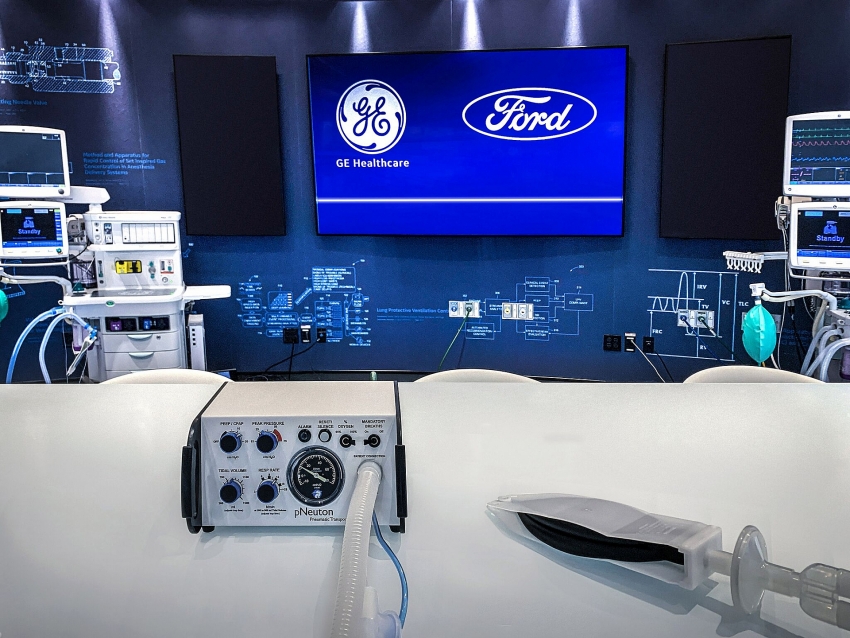Ford partners GE Healthcare to produce 50,000 ventilators to fight off coronavirus
 |
| Ford and GE Healthcare are planning to produce about half of the 100,000 ventilators the US government is targeting to produce in 100 days to fight the coronavirus |
Ford will provide its manufacturing capabilities to quickly scale production, and GE Healthcare will provide its clinical expertise and will license the ventilator from Airon Corp. – a small, privately-held company specialising in high-tech pneumatic life support products. GE Healthcare brought the design to Ford’s attention as part of the companies’ efforts to produce ventilators more quickly and in substantial numbers.
The Airon-licensed Model A ventilator – a basic, affordable design that operates on air pressure without the need for electricity – addresses the needs of most COVID-19 patients and production can be quickly scaled to help meet growing demand in the US.
“The Ford and GE Healthcare teams, working creatively and tirelessly, have found a way to produce this vitally needed ventilator quickly and in meaningful numbers,” said Jim Hackett, Ford’s president and CEO. “By producing this ventilator in Michigan, in partnership with the UAW, we can help healthcare workers save lives, and that’s our No.1 priority.”
Ford plans to start production in the week of April 20, quickly ramping up to reach full production as the company works to help meet surging demand. Ford expects to be able to produce 1,500 of these ventilators by the end of April, 12,000 by the end of May, and 50,000 by July 4 – helping the US government meet its goal of producing 100,000 ventilators in 100 days.
The Airon-licensed Model A ventilator will be assembled at Ford’s Rawsonville Components Plant in Ypsilanti, Michigan. The plant will produce the ventilators nearly around the clock, with 500 paid volunteer UAW-represented employees working in three shifts. Airon currently produces three Model A ventilators per day in Melbourne, Florida. At full production, more than 7,200 Airon-licensed Model A ventilators will be produced per week at Ford’s Rawsonville plant.
“From the days of Rosie the Riveter, UAW members have stepped up during difficult times in this nation’s history for the good of us all,” said UAW International President Rory Gamble. “Today’s announcement by Ford that UAW volunteer paid employees will make ventilators at Rawsonville is in that tradition. We are working very closely with Ford to make sure that all CDC guidelines are followed and that we are exercising an abundance of caution inside the plant. Ford and our UAW Ford members should be commended for stepping up in these very uncertain times.”
The Airon-licensed Model A ventilator is the second Ford-GE Healthcare ventilator collaboration. Last week, Ford and GE Healthcare announced a separate effort to produce a simplified ventilator design from GE Healthcare, known as the Ford-GE R19 Ventilator. The combined ventilator supply will help meet the increasing surge in demand for ventilators around the US in the fight against COVID-19, each uniquely designed to meet time, production volume, and patient care requirements.
“We applaud Ford for its efforts to lend its manufacturing capabilities to help quickly scale the Airon-licensed Model A ventilator and arm clinicians in the fight against COVID- 19,” said GE Healthcare President and CEO Kieran Murphy. “Our deep understanding of the healthcare industry with Ford’s supply chain and production expertise will help meet the unprecedented demand for medical equipment. We continue to be encouraged by how quickly companies are coming together to address this collective challenge.”
GE Healthcare and Ford consulted with medical experts in determining the Airon-licensed Model A ventilator is well-suited for COVID-19 patient care. The design, which has been in use since 2004, is expected to meet the needs of more than 90 per cent of COVID-19 patients with respiratory failure or breathing difficulties. The ventilator is designed for quick setup, making it easy for new healthcare workers to use – and can be deployed in an emergency room setting, during special procedures or in an intensive care unit, wherever the patient may be located.
What the stars mean:
★ Poor ★ ★ Promising ★★★ Good ★★★★ Very good ★★★★★ Exceptional
Themes: Together We Win
- Greater Mekong Subregion executives to discuss sustainable tourism
- TCPVN donates 1,200 medicine bags to COVID-19 patients in southwest
- AB InBev supports orphans with scholarships amid COVID-19
- Evaluating the reach of support in turbulent times
- Gamuda Land grants “Back to School” scholarships to support disadvantaged students
Related Contents
Latest News
More News
- Rising consumption and travel fuel ‘Tet season’ stocks (February 11, 2026 | 11:43)
- Education as strategic capital: why Dwight School Hanoi represents a long-term investment in Vietnam’s future (February 10, 2026 | 19:00)
- Green logistics–the vital link in the global energy transition (February 09, 2026 | 19:35)
- Wages and Lunar New Year bonuses on the rise (February 09, 2026 | 17:47)
- Temporary relief for food imports as businesses urge overhaul of regulations (February 07, 2026 | 09:00)
- Opella and Long Chau join forces to enhance digestive and bone health (February 06, 2026 | 18:00)
- Vietnam-South Africa strategic partnership boosts business links (February 06, 2026 | 13:28)
- Sun PhuQuoc Airways secures AJW Group support for fleet operations (February 06, 2026 | 13:23)
- Pegasus Tech Ventures steps up Vietnam focus (February 05, 2026 | 17:25)
- The generics industry: unlocking new growth drivers (February 04, 2026 | 17:39)

 Tag:
Tag:


























 Mobile Version
Mobile Version